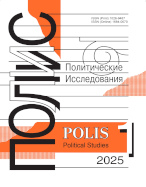The Principle of Historicity and the A Priori Knowledge:
Politico-Analytical Retrospective of the Russian Revolution
Khoros V.G.,
Head of the Center for Development and Modernization Studies, Primakov National Research Institute of World Economy and International Relations, Russian Academy of Sciences, khoros@imemo.ru
elibrary_id: 72733 |
DOI: 10.17976/jpps/2018.06.11
Khoros V.G. The Principle of Historicity and the A Priori Knowledge: Politico-Analytical Retrospective of the Russian Revolution. – Polis. Political Studies. 2018. No. 6. https://doi.org/10.17976/jpps/2018.06.11
The article gives comment on the special issue of the “History and Modernity” journal devoted to the centenary of the Russian 1917 revolution. The articles published in this issue reflect the public opinions as well as estimations of academic circles on the subject, on the whole. There are two main approaches. First, vision of and accent on objective reasons of revolution which, to a significant extent, the preceding investigations pointed out; and second, a quest of new interpretations predominantly connected with negative characteristics of the revolution. But the latter approach often ignores the principle of historicity, that is, why actors in the past thought and acted in such or another way in specific historical situation and only on the base of this adequate understanding a scientific or moral estimation is possible. The concept of the October revolution much depends on estimation of its results, that is, the Soviet epoch in the Russian history. The author presents his own explanation of the Soviet period in the context of world-wide evolution of the socialism. His main idea is to understand the Soviet socialism as many-sided phenomenon where to see only negative aspects would be wrong. The same approach is necessary in case of 1917 revolution(s).
References
Ayvazov A.E., Belikov V.A. The Economic Prerequisites of the October 1917 Revolution. – Istoriya i sovremennost’. 2017. No. 2. P. 145-161. (In Russ.) URL: https://www.socionauki.ru/journal/articles/1313856/ (accessed 15.09.2018).
Buldakov V.P. Krasnaya smuta. Priroda i posledstviya revolutsionnogo nasiliya [The Red Troubles. The Nature and Consequences of Revolutionary Violence]. Moscow: ROSSPEN. 2010. 376 p. (In Russ.)
Grinin A.E. The Entente, World War I and the February 1917 Revolution: on Some Aspects of Historical Links. – Istoriya i sovremennost’. 2017. No. 2. P. 100-123. (In Russ.) URL: https://www.socionauki.ru/journal/articles/1313724/ (accessed 15.09.2018).
Grinin L.E. The Russian Revolution in Terms of Modernization Theory. – Istoriya i sovremennost’. 2017. No. 2. P. 22-57. (In Russ.) URL: https://www.socionauki.ru/journal/articles/1313670/ (accessed 15.09.2018).
Huntington S.P. Political Order in Changing Societies. New Haven, London: Yale University Press. 1968. 488 p.
Khoros V.G. Russkaya istoriya v sravnitel’nom osveschenii [The Russian History in Comparative Perspective]. Moscow: Aspect Press. 1994. 191 p. (In Russ.)
Khoros V.G. On the Causes of the Russian Revolution. – Polis. Political Studies. 2010. No. 5. P. 161-175. (In Russ.) URL: http://www.politstudies.ru/files/File/2010/5/14.pdf (accessed 05.09.2018).
Khoros V.G. The Historical Optimism of Boris Mironov. – Bylye Gody. 2016. Vol. 41-1. No. 3-1. P. 848-856. (In Russ.) URL: https://docplayer.ru/34876888-Bylye-gody-3-1-rossiyskiy-istoricheskiyzhurnal.html (accessed 05.09.2018).
Lapkin V.V. An Afterward to the Centenary: on the Political, Legal, and Agrarian Prerequisites of the Russian Revolution. – Istoriya i sovremennost’. 2017. No. 2. P. 211-246. (In Russ.) URL: https://www.socionauki.ru/journal/articles/1313955/ (accessed 15.09.2018).
Lipkin A.I. The Place of October 1917 in the History of Russia: a Revolution or a Rebellion? – Istoriya i sovremennost’. 2017. No. 2. P. 86-99. (In Russ.) URL: https://www.socionauki.ru/journal/articles/1313710/ (accessed 15.09.2018).
Malinova O.Yu. The Commemoration in Russia of the Centenary of the 1917 Revolution(s): Analysis of Strategies of the Key Mnemonic Actors. – Polis. Political Studies. 2018. No. 1. P. 9-25. (In Russ.) https://doi.org/10.17976/jpps/2018.01.02 (accessed 15.09.2018).
Mironov B.N. Sotsial’naya istoriya Rossii perioda imperii (XVIII – nachalo XX v.): Genezis lichnosti, demokraticheskoi sem’i, grazhdanskogo obshchestva i pravovogo gosudarstva [Social History of Russia during the Period of the Empire (18th – early 20th century): The Genesis of the Individual, Democratic Family, Civil Society and the Rule of Law]. Vol. 1. Saint Petersburg: Dmitriy Bulanin Publishers. 2003. 548 p. (In Russ.)
Mironov B.N. Blagosostoyanie naseleniya i revolutsii v imperskoi Rossii: XVIII – nachalo XX veka. [The Welfare of Population and Revolutions in Imperial Russia: 18th – the Beginning of 20th Century]. Moscow: Novyi Hronograf. 2010. 911 p. (In Russ.)
Mironov B.N. Rossiiskaya imperiya: ot traditsii k modernu [The Russian Empire: from Tradition to Modernity]. Vol. 3. Saint Petersburg: Dmitriy Bulanin Publishers. 2015. 990 p. (In Russ.)
Marchenya P.P., Razin S.Yu. Iosif Stalin kak krest’yanskii tsar’: Vtoroi Mezhdunarodnyi kruglyi stol “Stalinizm i krest’yanstvo”. (Zasedanie No. 4 teoreticheskogo seminara “Krest’yanskii vopros v otechestvennoi i mirovoi istorii”). [Joseph Stalin as the Peasant Tsar: Second International Round Table “Stalinism and the Peasantry” (Session No. 4 of the theoretical seminar “The Peasant Question in the Domestic and World History”)]. – Stalinizm i krest’yanstvo. Sbornik nauchnykh statei i materialov kruglykh stolov i zasedanii teoreticheskogo seminara “Krest’yanskii vopros v otechestvennoi i mirovoi istorii”. Pod red. P.P. Marchenya, S.Yu. Razina [Stalinism and the Peasantry. Collection of Scientific Articles and Materials of Round Tables and Meetings of the Theoretical Seminar “The Peasant Question in the Domestic and World History”. Ed. by P.P. Marchenya, S.Yu. Razin]. Moscow: Izdatel’stvo Ippolitova. 2014. P. 615-708. (In Russ.)
Oganisian Yu.S. The October Revolution and Terror. A Historical Essay with Output Concerning Modernity. – Istoriya i sovremennost’. 2017. No. 2. P. 162-190. (In Russ.) URL: https://www.socionauki.ru/journal/articles/1313869/ (accessed 15.09.2018).
Tsirel S.V. The Revolution of 1917 as an Alternative to the Failed Reformation. – Istoriya i sovremennost’. 2017. No. 2. P. 58-85. (In Russ.) URL: https://www.socionauki.ru/journal/articles/1313680/ (accessed 15.09.2018).
Yerokhov I.A. Russian Revolution as an Ideal Subject for Political Philosophy. – Istoriya i sovremennost’. 2017. No. 2. P. 124-144. (In Russ.) URL: https://www.socionauki.ru/journal/articles/1319813/ (accessed 15.09.2018).
See also:
Yerokhov I.A.,
The Revolution, Which Will Never Happen Again. – Polis. Political Studies. 2016. No6
Pantin I.K.,
To the question of the character of the October revolution. – Polis. Political Studies. 2013. No6
Rabotyazhev N.V.,
Between tradition and utopia: left-wing conservatism in Russia. – Polis. Political Studies. 2014. No4
Pastukhov V.B.,
Ukrainian revolution and Russian counter-revolution. – Polis. Political Studies. 2010. No5
Pantin I.K.,
Russian revolution as a problem of political philosophy. – Polis. Political Studies. 2011. No5





.jpg)






 print
print
.jpg)
.jpg)